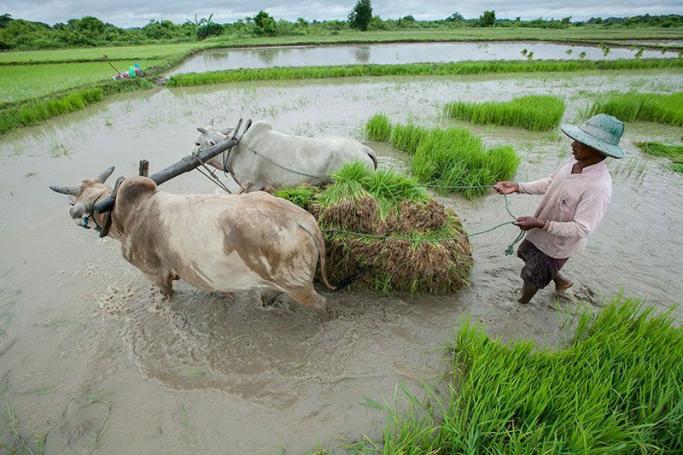BYINKAT VILLAGE, Mandalay Region - Kyaw Win is one of the millions of farmers who have long struggled to make ends meet in the harsh environment of central Myanmar’s Dry Zone.
But last year he began cultivating high-quality rice seeds at his farm in Byinkat Village and closely followed the growing instructions for the drought-resistant variety, which was supplied by international NGO AVSI.
Since then, his harvest has significantly increased. “I can now produce 100 paddy baskets per acre by using the methods of AVIS. Some farmers have imitated me and asked about my farming practices,” Kyaw Win said, adding that his harvest had increased with about 40 percent.
In the Dry Zone, some 10 million farmers rely on rainy season rice, oil seeds and pulses. Many languish in poverty and debt, and a lack of enough food is common. The region’s drought is compounded by the poor quality groundwater and by climate change, which has caused increasingly erratic rainfall in the past decade.
The introduction of more productive and resilient rice seeds, government officials and aid workers said, is a key strategy for helping the vulnerable communities.
“Climatic change in the DryZone is affecting the incomes of farmers through unseasonal rainfall or drought,” said Aung Soe Win, project manager of AVIS in Yamethin Township, Mandalay Region.
INTRODUCING NEW SEEDS
His organisation has been freely supplying four villages in the area with 13 varieties of high-quality paddy seeds since 2014. Aung Soe Win said AVIS teaches farmers how to grow the paddy and it provides them with farming machinery, while collecting feedback from farmers on which varieties perform best.
AVIS is working together with the Livelihoods and Food Security Trust Fund (LIFT), a poverty reduction donor fund supported by 12 governments, and the International Rice Research Institute, which has developed rice seeds that are more resistant to drought and the saline groundwater found in the area.
LIFT’s Dry Zone Programme brings together nine NGOs and UN agencies to improve livelihoods, food security and child nutrition among vulnerable families.
The AVSI project supports the wider efforts of the Agricultural Department to promote the use and proper cultivation of more productive rice seeds.
Kyaw Myin Zaw, an officer at Mandalay Region’s Agricultural Department, said it provides 90,000 baskets of high-quality paddy seeds each year to farmers at subsidised prices, which is enough to plant some 1.3 million hectares of paddy.
The department grows the seeds at specific farms and sends some of its surplus seeds to Magwe and Sagaing, two other Dry Zone regions, he added.
PRACTICAL CHALLENGES
Thet Naing Win, an officer at Yamethin Township’s Agriculture Department, said, however, that his department was too short-staffed to help farmers switch to better seeds and to teach them how to properly grow such varieties.
“We have 16 staff members to reach farmers from 64 village tracts. This means that each staffer is working in nearly 30 villages in six village tracts,” he said. “We need more staff members and other facilities to work effectively in each village.”
Aung Soe Win, of AVSI, said improving farm methods to ensure new varieties thrive is a major challenge not only because of a lack government resources, but also because farmers are not always committed to innovation.
“If more farmers would be careful about growing methods and techniques they would produce more rice, but many farmers don’t care enough,” he said.
Kyaw Naing Oo, secretary of the Agriculture and Livestock Committee at Mandalay Region parliament, said poor farmers often also fail to properly store high-quality seeds from their harvest so they can plant them again next season.
“Farmers selloff all paddy after the harvest as they need money,so they cannot keep the seeds for next crop,” he said, adding that farmers need financial support, as well education, to raise production.
“The government should conduct more education campaigns so farmers understand how to grow high-quality paddy through model farming,” said Kyaw Naing Oo, a National League for Democracy (NLD) MP from Singu Township.
Myint Swe, another Mandalay Region NLD MP, said government agencies had long failed to connect with farmers and supply them with the right seeds and knowledge.
Tint Wai Tun, a marketing manager at a private fertiliser company, said farmers were now increasingly turning to chemical fertilisers rather than high-quality seeds to increase production. “But poor quality seeds will generate only lower quantity harvest,” he said.
(Edited by Paul Vrieze)
You are viewing the old site.
Please update your bookmark to https://eng.mizzima.com.
Mizzima Weekly Magazine Issue...
14 December 2023
Spring Revolution Daily News f...
13 December 2023
New UK Burma sanctions welcome...
13 December 2023
Spring Revolution Daily News f...
12 December 2023
Spring Revolution Daily News f...
11 December 2023
Spring Revolution Daily News f...
08 December 2023
Spring Revolution Daily News f...
07 December 2023
Diaspora journalists increasin...
07 December 2023
Myanmar's ambassador to the UN appeals for help to end military coup












